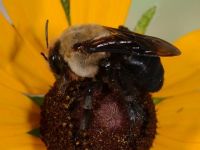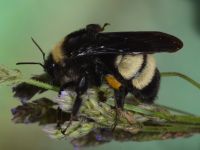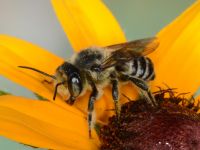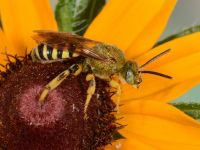Pollinator Research
Dr. Dwight Williams, entomologist formerly at the University of South Carolina and Cypress Gardens and Dr. Merle Shepard, Professor Emeritus of Entomology at Clemson University are conducting studies to document what pollinator species are present on Spring Island.
Since 2013, LowCountry Institute staff have worked with Clemson Emeritus Professor Dr. Merle Shepard and entomologist Dr. Dwight Williams on the Spring Island Pollinator Project. Monthly sampling consists of photographing specimens for later identification, recording butterfly species and most importantly, chasing around butterflies, wasps and other species with bug nets! Another survey technique includes placing painted cups containing a soap solution in fields, gardens and other natural areas on the island. The insects, especially pollinator species, are attracted to the brightly colored cups, captured and later identified by Dr. Sam Droege at the U.S. Geological Survey as part of a long-term study assessing bee diversity on southern barrier islands. Information collected during the study is being shared with other scientists in the region to give us all a better understanding of the pollinators of the Lowcountry.
The information that has been gathered thus far provides excellent baseline information on the essential pollinator species that live in the Lowcountry. Since the study began in 2016, we have documented 162 species of insects visiting flowering plants.
- 75 species, 49 genera and 13 families of Hymenoptera (bees, wasps, ants)
- 53 species, 47 genera and 11 families of Lepidoptera (butterflies and moths)
- 17 species, 15 genera and 5 families of Diptera (flies)
- 4 species, 2 genera and 1 family of Orthoptera (grasshoppers and crickets)
- 8 species, 9 genera and 6 families of Hemiptera (true bugs)
- 5 species, 5 genera and 3 families of Coleoptera (beetles)
This includes one new state record (the cuckoo bee, Triepeolus concavus, which is a cleptoparasite of sunflower bees – this means that the cuckoo bee lays its eggs on pollen masses collected by the sunflower bee for its own young, thereby “stealing” the resources) and several new county records. It is expected that several of the bee species identified by Dr. Droege will also be new state records. Many of the pollinator species have been photographed by Dr. Shepard to create a Spring Island photographic reference collection. According to the researchers, Spring Island may have the best studied pollinator population in South Carolina.
Thanks to partial support by the Trust/LCI, Dr. Sheppard and co-authors published “Insects and Spiders of Coastal South Carolina”, a pictorial field guide. https://www.amazon.com/Insects-Spiders-Coastal-South-Carolina/dp/0991134311
Dr. Sheppard and Dr. Williams presented their findings at the 2017 GA/SC Entomological Society joint conference.



